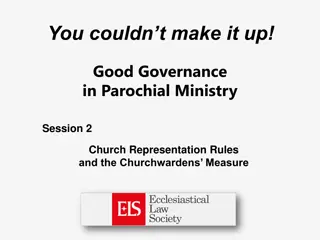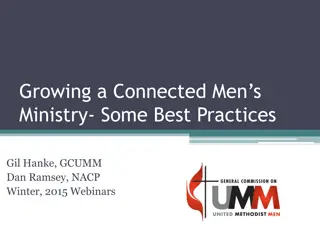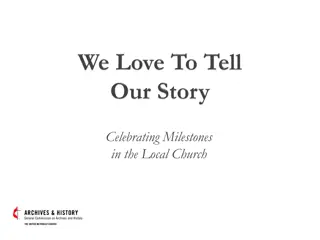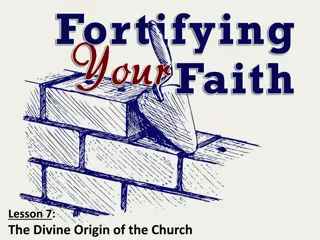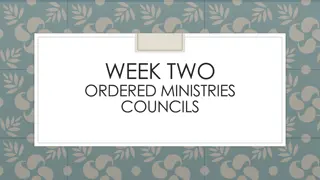Embracing the Joys and Challenges of Smaller Church Leadership
Discover the insights from Rev. 3:7-13 on leading a smaller church and FIEC's definition of small churches. Explore the perspective that small churches aren't inferior and learn how to measure spiritual health beyond numbers. Uncover the elements of a healthy church, emphasizing love, Christian character, the Word of God, and prayer.
Download Presentation

Please find below an Image/Link to download the presentation.
The content on the website is provided AS IS for your information and personal use only. It may not be sold, licensed, or shared on other websites without obtaining consent from the author. Download presentation by click this link. If you encounter any issues during the download, it is possible that the publisher has removed the file from their server.
E N D
Presentation Transcript
Smaller Churches Seminar The joys and challenges of leading a smaller church
Rev 3: 7-13 - To the Church in Philadelphia 7 To the angel of the church in Philadelphia write: These are the words of him who is holy and true, who holds the key of David. What he opens no one can shut, and what he shuts no one can open.8I know your deeds. See, I have placed before you an open door that no one can shut. I know that you have little strength, yet you have kept my word and have not denied my name.9I will make those who are of the synagogue of Satan, who claim to be Jews though they are not, but are liars I will make them come and fall down at your feet and acknowledge that I have loved you.10Since you have kept my command to endure patiently, I will also keep you from the hour of trial that is going to come on the whole world to test the inhabitants of the earth.
11I am coming soon. Hold on to what you have, so that no one will take your crown.12The one who is victorious I will make a pillar in the temple of my God. Never again will they leave it. I will write on them the name of my God and the name of the city of my God, the new Jerusalem, which is coming down out of heaven from my God; and I will also write on them my new name.13Whoever has ears, let them hear what the Spirit says to the churches. -----------------------------
FIEC defined a smaller church as one having 35 members or less approx. 50% of the churches in the fellowship. Small churches are not better or worse than large churches, they are just different. Being a small church pastor is not less than being a large church pastor; it is not second class or inferior or any less needed it just requires different skills to use in the place God has placed us. Karl Vaters
Small churches are not automatically churches that are failing or for that matter are sick, stuck in their ways, limited in their vision, need to be fixed or less than larger churches. Karl Vaters We need to find a way of measuring success / spiritual health without using numbers. Have you heard it said of a large church: - It s a great church; but if it s said of a small church:- it s a great little church or it s a wonderful church for its size. It s a bit like saying to a lady; you look really good, considering your age. Churches can be great whatever their size.
What distinguishes a healthy church (big or small)? 1) A church where Christians love each other, encourage each other and are a blessing to each other. 2) A church where becoming more like Jesus (Christian character) and modelling Jesus is seen as really important. 3) A church where the Word of God is a priority because people want to deepen their knowledge of God, get to know Him better and be better equipped for service. 4) A church where prayer is foundational to all things.
5) A church whose leadership is outward looking and has a real heart for evangelism. 6) A church that is aware of its community and is seeking to be a part of its community so as to build relationships and to create gospel opportunities. 7) A church where the members use their individual gifts to create gospel opportunities. 8) A church that is willing to put gospel opportunities over personal preferences.
9) A church where the leaders encourage others to serve and use their gifts. 10) A church where the gathered worship service is inspiring and welcoming to visitors. A church doesn t need to be big to be a thriving, spiritually healthy church. There are many similarities between a large and small spiritually healthy church; but there are also differences. You don t need to look like or seek to think like a big church you are not a big church (indeed doing so can be both counter- productive and demoralising).
Questions for discussion on distinguishing marks of a healthy church Choose two of the above you can identify with in your church situation. How do you ensure they are kept to the fore? In the list are there any that you feel you need to work on and how do you think they can become hallmarks of the local church you serve in?
Joys of leading a smaller church 1) You are where your Heavenly Father wants you to serve Him and His people. 2) You may not be well known across the country like some church leaders are but God knows you and your joy is found in Him, not in others recognition. 3) Our joy is to be found in making God known and not in us becoming well known 4) God has gifted you to serve in that specialised situation. 5) Often smaller churches are more a part of the local community
6) Leading a smaller church is often far more relational than what larger church pastoring can be you know everybody and in a much deeper way (and they also know you likewise). 7) It s easier to know the privilege of walking closely with people as they go through desperately sad trials in a smaller church. And they know better the one seeking to support to them. 8) Smaller churches are more of a family far more difficult in a larger church. 9) Isn t quality better than quantity. You can impact everyone s life and see personally the result of the Spirit s ongoing work in them.
Questions for discussion on the joys of leading a smaller church In what areas of your ministry do you find the greatest joy? What things do you think prevent you from knowing greater joy in your ministry?
Challenges of leading smaller church leaders: - 1) The unwritten church culture this is the way we do things / that won t work here. 2) An elderly eldership / congregation and a new young pastor seeking to influence and lead. 3) We like church like this - Refusing to change to accommodate families / young people / typical C21st unchurched visitors. 4) The view that if a small church stays small it isn t doing a good job (reflect on the church leader).
4) In larger churches the leadership drive the church culture In a smaller church the members are often the culture, and it can be a real challenge for a new (especially younger) pastor to influence / change the church culture. 6) The influence of strong characters. Place a drop of dye in a cup of water and it will impact the whole cup; place a pint of dye in a lake and its impact won t go beyond maybe 10 mtrs. 7) Joy killers Not seeing conversions or Christians joining who move into the area). Feeling insignificant (maybe nearby large FIEC church seems to get all the attention). Loneliness; Financial struggles.
Questions for discussion on the challenges of leading a smaller church The unwritten church culture of your local church Do you recognise it? How have you changed it / begun the journey? Have you recognised that a smaller church doesn t need to be growing significantly numerically to be a healthy church? How was this brought home to you?
Encouragements and reminders for smaller church leaders 1) Remember when the going gets tough rejoice you are in the place your Heavenly Father wants you to serve Him. You are the man the Lord has given to that local church / community until He calls you away. 2) Pray for numerical growth, serve with all your heart; but don t need it / depend upon it, for your contentment in your service. That must always come from the gospel, knowing God loves you and knowing you are serving in the place God wants you to be in.
3) If God calls you to be a king, dont stoop to be a missionary, but if God calls you to be a missionary, don t stoop to be a king. In pastoral ministry:- If God calls you to serve in a larger church, don t stop to serve in a smaller church, but if God calls you to serve in a smaller church, don t stoop to serve in a larger church. Why would you want to be anywhere other than where God wants you to be (always the best place to be).
4) When folks here ask, Whats the church like where you serve? or How s church life going? Don t talk about numbers; rather talk about spiritual health, lives being transformed day by day. Talk about the churches heart for its community; maybe the odd personal story of how the church is supporting each other. 5) You have every reason to be content serving in the smaller church you serve in, if that is where God wants you to be. But please don t ever become complacent there or allow the church to become complacent in its calling to shine for the gospel. I m afraid there are some small churches that are small and unhealthy because of complacency and that will not do.
Questions for discussion relating to leadership encouragements What have you been encouraged by in the last 12 months in the local church you serve in? Was there anything in the list that you realised ought to be a source of encouragement to you? How are you going to make it so?
Things smaller churches should do very well: - 1) Be welcoming Visitors are very noticeable in a smaller church and they can t hide in a smaller church. Make sure the welcome is warm but not oppressive. Don t put them off before the preacher even opens his mouth. 2) Be relational. This is often given as the reason people join a small church and remain in it. 3) Care for missing / struggling folks.
4) An informality which can be a blessing if people see something that needs doing, hopefully they will do it. 5) Preaching to the needs of the church (because easier to identify). 6) People are more important than programs or performances. 7) Know the local community and be known by them.
How to help leaders of larger churches better understand how to help smaller churches without it appearing like imposing
Questions for discussion on things smaller churches should do well Of the ones you can identify with as being evidenced in the church you serve in How do you ensure they are maintained? In the list are their any that you feel you need to work on and how do you think they can be become part of your local churches practice?
Issues facing smaller churches: - 1) Some small churches are like entering into a living museum. 2) The thought process that goes along the lines that, if we provide for larger churches, the fruit filters down to smaller churches. Is that really how it works? 3) Theological colleges aren t always good at preparing men for the rigours of small church pastorates.
4) Those who train in large church team-based ministries can find it difficult to adjust to the loneliness of small church pastoring (may not have other elders). 5) For potential pastors it may not be as attractive as being part of a team ministry in a larger church. 6) Pastors with a few years experience being tempted by the large church perception (promotion / recognition etc) 7) A high turnover of pastors is not good for the church or for the community (especially if rural or small town).
8) Living in the past / hankering after the good old days forgetting we are called to serve in our own culture / circumstances. 9) A lack of gifted people to undertake various ministry needs (musician) / opportunities (children / young people). 10) A preoccupation with focusing on needing families / young people. 11) Pastoring in a smaller church all too often is seen as a good place to train before moving to a larger church (as if a promotion).
12) Pastors fail to see the privilege of a long-term smaller church ministry within a community. 13) Pastors who are so busy doing ministry that they neglect both pastoral support of the members and their own growth in grace. 14) Smaller communities are sadly less and less communities, with residents often travelling into towns / cities for work, recreation, school and church.
15) Many smaller communities are out of the financial reach of younger people / families (often locals being forced to buy elsewhere). 16) As a church don t try to do too much (it s not about how long the CV is) but rather do less but use it.
Questions for discussion on issues facing smaller churches today How have you addressed some of the issues listed? What issues have you just identified that perhaps you need to start thinking through?
Possibly useful books for smaller churches or those ministering in smaller places (irrespective of church size) The Grasshopper Myth Karl Vaters Why join a small Church John Benton Renewal - John James Knowing our times John Stevens Small Church essentials Karl Vaters The big picture for small churches John Benton Small Town Jesus Donnie Griggs A big gospel in small places Stephen Witmer










